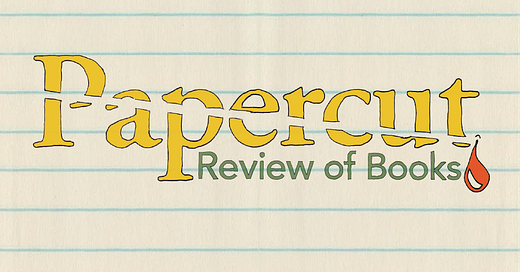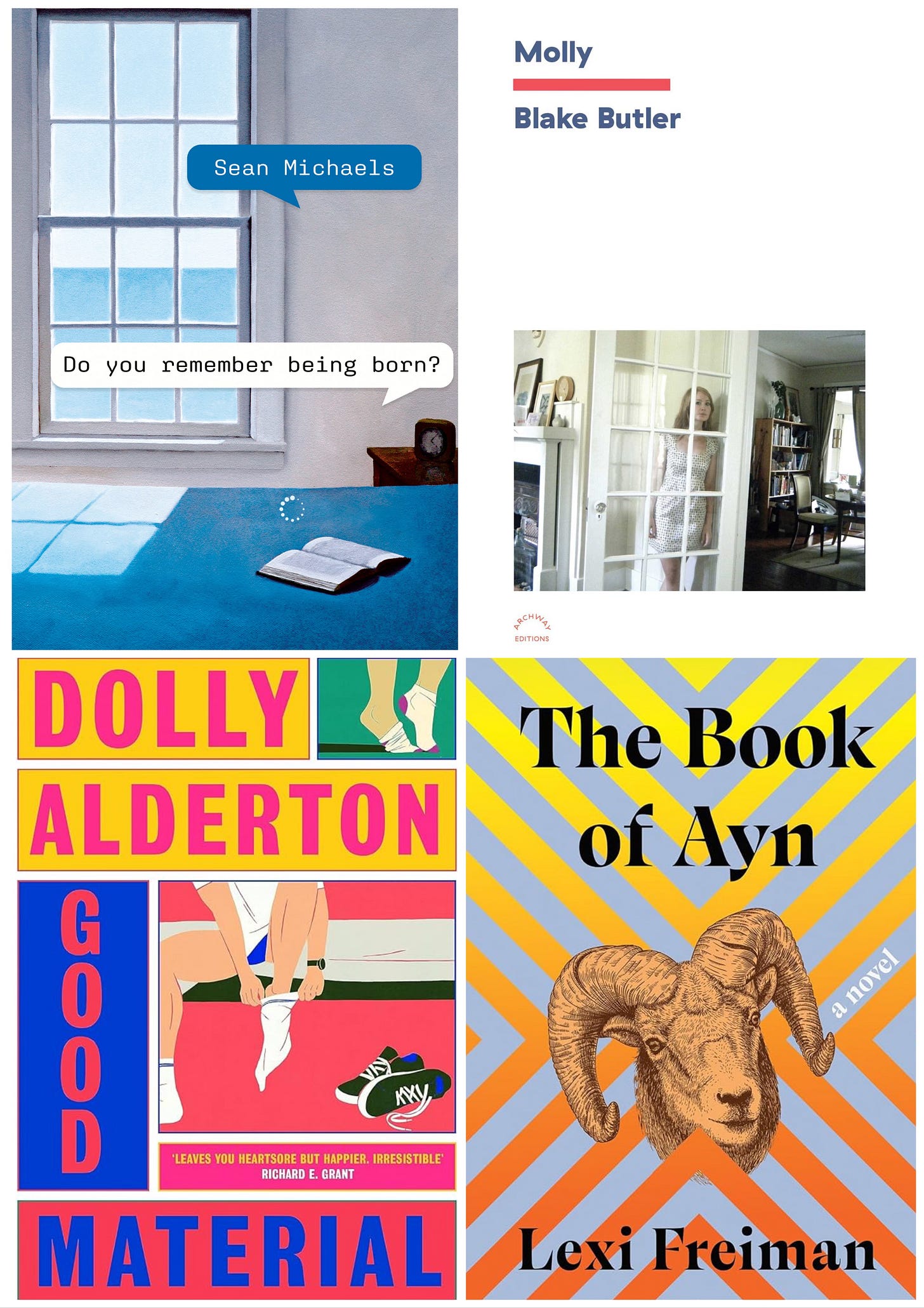Cooking Spaghetti with War Criminals
Discussed: Molly by Blake Butler, Good Material by Dolly Alderton, Do You Remember Being Born by Sean Michaels, The Book of Ayn by Lexi Freiman
Papercut is a weekly newsletter written by Ryan David Allen (divorced) and Andrew Sampson (gay). Each Tuesday, you’ll receive a new issue straight to your inbox, featuring 4 capsule reviews of whatever we happen to be reading at the moment. Each review will be 500 words or less.
We aim to read widely. We’ll write about Canadian books because when a Canadian book drops it disappears without a trace, unless it has the good fortune to be dropped into the laps of critics in the Lower 48 or the small-batch cohort of Canadian authors and critics committed to the cause. We’ll write about old books so as not to let market forces dictate our course. We’ll digress, we’ll freewheel, and we’ll do so because Lionel Trilling said that since a book is always about something else, reviews too should be something else.
Molly by Blake Butler
Pro-lifers and astrology people are both wrong, albeit in different ways. Life doesn't begin at insemination, and it does not begin with the moment you are born, the time that you ask your mother about when you want a friend to do your birth chart in exchange for baked goods or a stick-and-poke. The off-ramp towards personhood arrives at some other indefinite point, for most not too long after coming into the world. It begins with the first instance of not getting what you want, or worse, what you need, and it is there that the black-filled buoy of wanting, the buoy that ferries you through a life of trials and joys, starts to fill up. Such is why some people of immense privilege will die without ever having lived. Must be nice.
Life, too, doesn't end with one’s last breath. David Berman, another artist and a suicide case, sang, "When the dying's finally done and the suffering subsides / all the suffering gets done by the ones we leave behind." You die, your buoy breaks open; ink spills forth and covers everyone. There'll be black at funerals. There'll be nights of staring at dark ceilings. Dark will encircle the eyes. You'll wake before the light and drink all the coffee all the way black. All that remains after them is us. It's all forgivable. Then some husband goes and inks out a book.
Molly, an excellent book accounting author Blake Butler's relationship with his wife, poet, and memoirist Molly Brodak, who took her life in a field not far from their home in 2020, is not precious, or airy, or an artless jumble of raw experience. The book begins, hurriedly and without elegiac tones, with the morning search for Molly's body. After this high-pitched horror, Butler revisits their relationship. He cites Brodak's journals, reads her emails, uncovers numerous affairs that she’d had over the course of their marriage, and tries to make sense of the person she kept to herself.
Some critics have said Butler’s project is an invasion of Brodak’s privacy. Literary revenge porn, one author said. This is not the case. Molly, ostensibly a book about Molly Brodak, is a book about Butler. There is a porousness to the boundaries of personhood. It's not a condemnation or a gotchya! moment for Butler to say that Molly was sometimes hurtful, sometimes manipulative. What was there to gain for a bewidowed husband—a lightning rod for public sympathy and goodwill so long as he kept his mouth shut—to write about such things? What's worth condemning is the idea that one might not love or grieve the dead because of extramarital affairs, their decision to leave this world or their unknowability.
- RDA
Good Material by Dolly Alderton
Dolly Alderton is no Nora Ephron – despite how much she (and her publisher’s marketing team) may desperately wish she was. Nominally, Good Material is a tale of heartbreak, like Heartburn, but unlike that roman-a-clef or even Ephron’s famous vinaigrette, it has no bite. It’s about as dry as a low-fat, salt-free, pot roast. Here’s the plot: A straight, 35-year-old comedian thinks he’s in the perfect relationship until the exact moment his girlfriend of many years says: “I’m out.” It’s hardly the same as finding out that your husband is fucking the wife of the British ambassador, but it will have to do. The problem, however, is that leading with a breakup that lacks any galvanizing event (the ex simply decided they weren’t compatible) strips the book of all narrative tension. The protagonist’s post-breakup descent into madness is so banal it’s making me irritated just summarizing it: he drinks too much, he fucks a 23-year-old, he awkwardly asks an old ex-gf why things didn’t work out; he gets misguided but well-meaning advice from his clueless friends, and he cries to his mother.
The other issue? The male POV of this novel never felt real for me. The author is curiously unwilling, or perhaps unable, to make him truly messy or unlikeable. I wished he was more of a bastard, that he had at least one or two serrated edges, or that he was even a bit of a sex pest. Instead, he’s simply an overgrown manchild with daddy issues. Boring! Making matters worse is the way Alderton can’t stop herself from explaining every one of his actions within an inch of its life. The reader will never experience the pleasure of having an original thought, because every time one threatens to form, the protagonist is suddenly delivering an endless bout of first-person exposition. Even worse, the book isn’t the least bit sexy. Rag on Sally Rooney all you want (I would never) but she can write heterosexual sex better than almost anyone I’ve read. You feel the tension. The push and pull. But when the narrator of this novel has a one-night stand with his ex, or the aforementioned 23-year-old, it feels about as sexy as a pair of soiled undergarments. By the end of the book, I felt nothing, only the sinking realization that I’d been bamboozled into reading a book written by three teenagers in a trenchcoat — a YA novel masquerading as adult fiction.
- AS
Do You Remember Being Born? by Sean Michaels
Do You Remember Being Born? No.
Do you remember watching in horror as your quirky, cape-wearing, smells-like-an-eraser, poet friend, a secret Niagara of feeling, tried to hold down a job at a tech company? Yes.
In Sean Michaels’ Do You Remember Being Born?, a poet has a shot at buying a house for their child. The catch is that the poet, based on Marianne Moore, has to compose a poem with a tech company’s well-trained AI bot. For a novelist whose previous book (The Wagers) had vigilantes stealing luck in a literal, granular form from the too-lucky of the world, the idea of a poet churning out a livelihood for themselves feels like Michael’s most fantastical formulation yet. It’s also his best book.
I don’t remember the amount of money the tech company plans on giving her because I lost track of the zeroes on the left side of the decimal. What I do remember is the moment when it seems like all of Marian’s new money might do away with their financial precarity. I also remember the strong, grisaille tone of the flashbacks, like when we see younger Marian lock her child out of her study to write poems.
Art in the age of child reproduction is thankfully more alluring to Michaels’ than the book’s anodyne billionaire tech mogul and the implications of AI on the world of art. That many people “can't tell the difference” between an AI poem and a real person’s poem shouldn’t be alarming yet. Think of how long we’ve lived in a world where most people can’t tell a good human poem from a bad human one.
- RDA
The Book of Ayn by Lexi Freiman
In The Book of Ayn, by Lexi Freiman, the best way to survive a cancellation is to court another one. Blackballed — at least in theory — after her satire of the opioid crisis earns a scathing New York Times review, our hero is faced with two, equally unappealing options: accept the criticism or lean into her exile and join the crowd of hucksters who make up the “intellectual dark web.” She chooses the latter, deciding that if the paper of record already thinks she’s a privileged brat for having the gall to write about poor people in Appalachia from a borrowed pied-à-terre in New York, then let them. After stumbling upon an Ayn Rand themed tour of Manhattan, she takes it as a sign of divine intervention, ordering all of her books late at night on Amazon and devouring them one by one when they arrive the next morning. Objectivism, Rand’s philosophy that behaving in one’s own self-interest is the only way to remain truly free, acts as a panacea for the protagonist, an appealing alternative to having to take any accountability for her actions.
Freiman, previously the author of Inappropriation, a clever satire of identity politics , aims to skewer the ways people on both sides of the political spectrum have turned conflict into clout and identity into ideology. Like her narrator, she’s fond of punching neither up or down, but sideways, at whoever happens to be standing there. We get cracks at a band of ADHD Adults with a hit song about being unable to finish their homework on time alongside visits to dissident soirees featuring podcasters ‘known for cooking spaghetti with war criminals and speaking the word ‘retard’ to power.’ But the book is ultimately hemmed in by its adherence to the conventions of literature. In order to inject pathos into an otherwise amoral novel, Freiman’s protagonist must, despite her skepticism that a person can only be understood through their own biography, reach an epiphany by the final page. After exploring the shadow economy of canceled grifters, and taking an ill-advised trip into the depths of wellness culture at a retreat promising to hasten ego death, the narrator comes to the conclusion that she’s only a contrarian because of her upbringing, shaped by the early death of her baby brother. After desperately trying to be an individual, she reaches the same conclusion as everybody else: It was childhood trauma all along.
- AS




